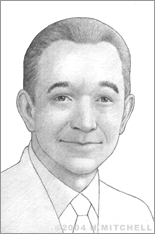James Hyde
Chemist James Franklin Hyde, the “Father of Silicones,” is credited with launching the silicone industry in the 1930s after he developed a method of creating silica, an ultra-pure form of glass.
Born in Solvay, New York on March 11, 1903, Hyde attended Syracuse University, earning a BA and an MA before heading to the University of Illinois, where he completed his PhD in organic chemistry. From there, he moved on to Harvard University, where he was granted a post-doctoral fellowship. In 1931, Hyde accepted a position with Corning Glass Works as the company’s first organic chemist, where he began researching new plastics in light of their potential challenges to the glass industry.
In 1934, he created a process for making fused silica, an impurity-free glass, using a method called “frame hydrolysis.” This was a major breakthrough in glass production, which had been practiced with little variation for thousands of years. He was named manager of the Organic Chemistry Research Laboratory in 1938. On Feb. 10, 1942, his patent for “the method of making a transparent article of silica” was granted. The following year, Corning Glass Works and the Dow Chemical Company created a joint venture known as the Dow Corning Corporation specifically to produce silicone products. Today, the company operates in more than 20 nations around the world.
With Hyde’s guidance, silica found its way into a variety of industries, with uses ranging from fiber optics and spacecraft windows to lenses for telescopes and manufacturing equipment. Hyde subsequently researched methods for converting silicon-containing compounds into silicones, which are now commonly used in electrical insulators, caulking compounds, lubrication fluids, water repellents, different types of rubber, and a variety of medical applications. Silicone was also used, of course, for breast implants until the early 1980s. The design of the Chemical Elements Periodic Table is also credited to Hyde.
In 1951, Hyde became Dow Corning’s senior research scientist for basic organosilicon chemistry. He retired in 1973, but he continued to serve the company as a research consultant. Among the honors he received over the course of his career were his induction into the Inventors Hall of Fame, the Perkin Medal, and the J.B. Whitehead Award from the National Academy of Sciences. In 1992, Dow Corning and the Dow Corning Foundation awarded the first J. Franklin Hyde Scholarship in Science Education in his honor.
Hyde died in 1999 at the age of 96.


